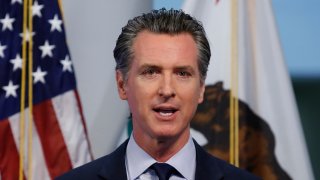
California companies must warn their workers of any potential exposure to the coronavirus and must pay their employees workers compensation benefits if they get sick with the disease under two laws that Gov. Gavin Newsom signed Thursday.
Newsom, a Democrat, signed the laws over the objections of business groups, who have said they are “unworkable.”
One of the laws makes people who have the coronavirus eligible for workers compensation benefits. It takes effect immediately and applies to all workers in the state, but it treats first responders and health care workers differently than other employees.
Police officers, firefighters and health care workers — including janitors who are in contact with COVID-19 patients — are eligible if they get infected while on the job.
All other workers are eligible only if their workplaces experience an outbreak. For companies with between five and 100 employees, the law defines an outbreak as four or more infected workers who work at the same location within a two-week period.
For companies with more than 100 employees, outbreaks are defined as at least 4% of workers working in the same location being infected during a two week period.
The rules for first responders and health care workers are permanent. The rules for everyone else expire on Jan. 1, 2023.
California
Workers don’t have to prove they were infected on the job to get benefits because the law assumes they got it while working. Instead, employers must prove that their workers did not get the virus while on the job to deny coverage.
In a letter to the state Legislature last month, business groups said they supported that for first responders and other groups at high risk of contracting the disease. But they said it wasn’t fair to do that for other occupations with a lower risk of infection. They called the law “unworkable for employers.”
Get a weekly recap of the latest San Francisco Bay Area housing news. >Sign up for NBC Bay Area’s Housing Deconstructed newsletter.
Newsom signed the law, authored by Democratic state Sen. Jerry Hill, during a Zoom call with supporters, including labor union leaders and members.
Monique Hernandez, a nurse, said nine of her fellow nurses were infected, though she works in an area called a “clean unit” where she does not have contact with coronavirus patients.
“There is no such thing as a clean unit when it comes to COVID-19,” she said. “I took that very personal.”
The second law that Newsom signed mandates that companies tell employees if they have been exposed to someone who has either tested positive, been ordered to isolate or died because of the virus. That law, authored by Democratic Assemblywoman Eloise Gomez Reyes, takes effect Jan. 1.
Companies must do so within one business day of learning of the exposures or they can face fines issued by the Division of Occupational Safety and Health.
Business groups, including the California Chamber of Commerce, opposed the bill because they said the law is vague and will be difficult for businesses to comply with, resulting in “good employers” facing hefty fines.
Newsom countered that the two laws “prioritize our workforce," including front line workers he said politicians “pay a lot of lip service to, but often we don't back up.”
___
Law that makes workers infected with the coronavirus eligible for workers compensation benefits: SB 1159
Law requiring companies tell workers about coronavirus exposure in the workplace: AB 685



